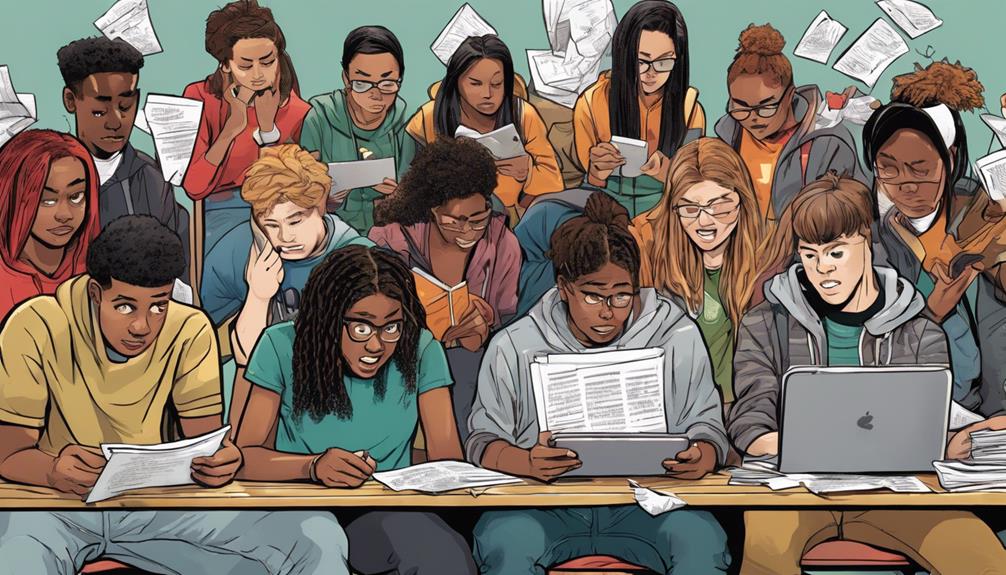Mastering the wait for college decisions involves knowing key deadlines. Regular Decision applications made by Dec-Feb yield notifications in March. Early Decision outcomes land Dec-Feb, binding Early Decision versus nonbinding Early Action. Survival tips suggest focusing on health, grades, and varied college options to avoid stress. Decision Day falls on May 1, requiring finalized choices and deposits. Utilize school resources, attend admitted students' days, and seek guidance for sound decisions. Understanding these dates and tips is vital for maneuvering the college application process.
Key Takeaways
- Expect notifications between December and February for early decisions.
- Use the waiting period to focus on academics and well-being.
- National College Decision Day is on May 1 for final choices.
- Attend admitted students' days for insights on prospective colleges.
- Utilize school resources and guidance for informed decisions.
Regular Decision Deadlines and Notifications
Regular decision deadlines for college applications typically range from December to February, with notifications commonly expected in March. Students who apply by these deadlines will receive their admission decisions in the early spring, allowing them sufficient time to compare offers from multiple institutions.
It is crucial for applicants to check with each school or utilize tools like the CFNC College Search for precise deadline information. Unlike early decision or early action applicants who may receive decisions earlier, regular decision candidates must patiently wait for their results.
This period of waiting can be both nerve-wracking and exciting as students eagerly look forward to the outcome of their college applications. Nonetheless, the regular decision process ensures that students have the chance to carefully consider their options before committing to a particular institution.
Early Decision and Early Action Results

Students who have applied early decision or early action can anticipate hearing back on their admission status between December and February.
For early decision applicants, this period may bring news of acceptance or rejection, with the binding nature of early decision requiring a committed enrollment if accepted.
On the other hand, early action applicants also receive their decisions during this time frame but have the flexibility of nonbinding admission, allowing them to evaluate multiple offers before making a final decision.
This phase can be both exciting and nerve-wracking for students anxiously awaiting news from their desired institutions, as it marks a significant step in their college application journey.
Tips for Surviving the Waiting Period

How can applicants effectively manage the waiting period for college decisions?
The waiting period can be challenging, but there are strategies to help applicants navigate this time with less stress. To begin with, it's important to enjoy senior year by spending quality time with friends and family, engaging in activities that bring joy.
Maintaining good grades is critical to prevent any potential admission offer rescission. Moreover, focusing on physical and mental health through exercise, relaxation techniques, and seeking support can aid in stress management.
Setting boundaries with family and friends to manage anxiety levels and avoiding fixating on one particular school can also contribute to a more balanced approach during this waiting period.
College Decision Day and Selection Process

National College Decision Day on May 1 marks a pivotal moment for high school seniors as they finalize their choice among college acceptance offers. It is a day when students commit to a particular institution by submitting their deposits. For those admitted under Early Decision or Early Action, this date may not hold the same weight as they have already secured their spots. However, for regular decision applicants, this deadline is crucial. To aid in the selection process, students can utilize resources provided by the schools, attend admitted students days, and seek advice from programs like NC Countdown to College. Making an informed decision is vital for a successful college experience.
| College Decision Day Benefits | Selection Process Tips |
|---|---|
| Finalize college choice | Use school resources for insight |
| Submit deposit | Attend admitted students days |
| Early Decision/Action exceptions | Seek guidance from college programs |
| Utilize school-provided resources | Make informed decisions |
| NC Countdown to College for advice |
Resources for College Search and Application

Numerous resources are available to assist individuals in their college search and application process. CFNC offers tools to find colleges that match specific needs and aids in the application process. It provides valuable information on student loans, repayment options, scholarships, and college financing for prospective students.
Understanding the costs and financing options, especially for medical school, is essential for applicants. Additionally, utilizing resources provided by potential schools for admitted students can offer further insights into the decision-making process. Admitted students should consider attending on-campus admitted students' days to get a feel for the campus environment and community.
Joining programs like CFNC's NC Countdown to College in October can also provide valuable application assistance and guidance.
Frequently Asked Questions
Can I Negotiate Financial Aid Offers With Colleges?
Yes, it is possible to negotiate financial aid offers with colleges. Contact the financial aid office to discuss your circumstances. Provide any relevant information that may impact your ability to fund your education.
What Happens if I'm Waitlisted by a College?
If waitlisted by a college, maintain communication with the admissions office, express continued interest, and inquire about steps to strengthen your application. Explore alternative options and submit any requested materials promptly for consideration.
Are Deferral and Waitlist Decisions Final?
When colleges defer or waitlist applicants, decisions aren't always final. It's like a door left ajar; there's still hope. Stay proactive by sending updates, expressing continued interest, and exploring other options.
Can I Appeal a College's Admission Decision?
While it is uncommon, some colleges may allow students to appeal an admission decision. Be sure to review the specific college's policy on appeals, gather relevant information, and present a well-reasoned argument for reconsideration.
How Can I Secure Housing at My Chosen College?
To secure housing at your chosen college, submit the required housing application by the specified deadline. Follow any additional steps outlined by the college's housing office. Consider roommate preferences, residence hall options, and any special accommodations needed. We recommend reaching out to potential roommates to discuss living preferences and habits. Research the different residence hall options available and consider the location, amenities, and community atmosphere. Lastly, if you require any special accommodations, be sure to communicate this with the college’s housing office. Taking the time to carefully consider your housing options and investing in french property now will ensure a comfortable and enjoyable living experience during your time at college.
Conclusion
In the intricate dance of college admissions, mastering decision dates is key. By understanding the timelines of regular decision, early decision, and early action, students can navigate the waiting period with grace.
Remember, patience is a virtue as you await notifications. With careful consideration and preparation, you can confidently choose the college that best fits your academic and personal goals.
Stay informed, stay calm, and embrace the journey ahead.









